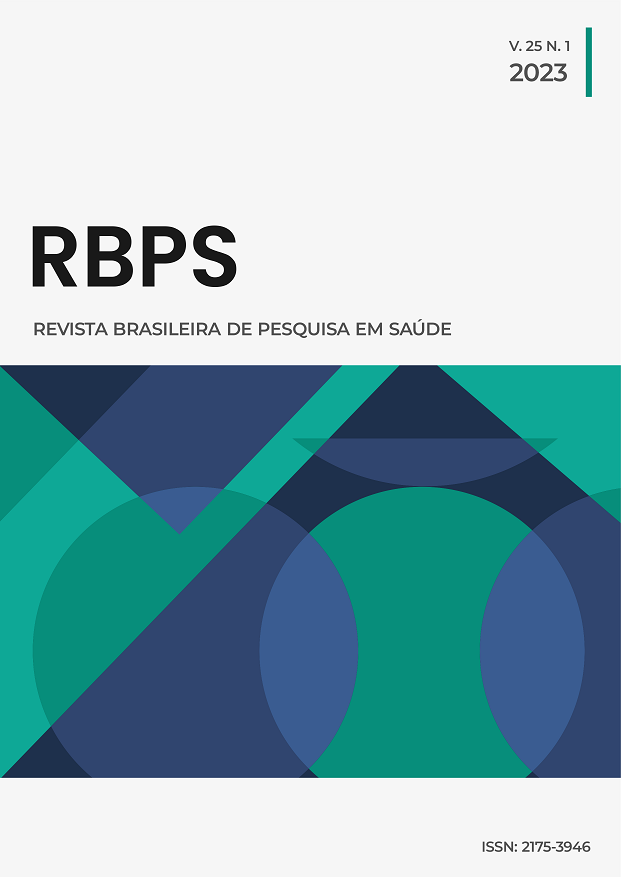Coping strategies, indicators of optimism and posttraumatic growth of the covid-19 pandemic in health care workers
DOI:
https://doi.org/10.47456/rbps.v25i1.39413Keywords:
COVID-19, Optimism, Posttraumatic Growth Psychological, Adaptation Psychological, Mental HealthAbstract
Introduction: Being a health care worker acting in a worldwide sanitary crises can be configured as
a stressful event. Objectives: This study aimed to describe the stressors related to covid-19 and verify
the coping strategies, life orientation and posttraumatic growth correlated to them among health
care workers during the pandemic. Methods: Cross-sectional, descriptive and analytical study. Thirty-
five health care workers of a convenience sample who were working professionally at the time
of data collect participated. These responded (fully online) to a socialdemographic and professional
characterization questionnaire, the covid-19 Stress Coping Scale — Health Care Workers, the Life
Orientation Test and the Posttraumatic Growth Inventory. Results: The most mentioned stressors
related to the COVID-19 pandemic were “concern about infecting people in their daily lives” and
“changes in routine”. The use of coping strategies “problem solving” and “information seeking” were
presented as the most used. As for life orientation, the participants were optimistic, with significant
rates of posttraumatic growth. Conclusion: Adaptive strategies added to a more optimistic life orientation
may be contributing to posttraumatic growth in the face of adversity imposed by covid-19.
Downloads
References
World Health Organization (WHO) [Internet]. WHO Direc¬tor-General’s opening remarks at the media briefing on COVID- 19. Genebra: WHO; 2020 [acesso em 19 jan. 2021]. Disponível em: https://www.who.int/director-general/speeches/detail/who-di¬rector-general-s-opening-remarks-at-the-media-briefing-on-co¬vid-19---11-march-2020
Gao J, Zheng P, Jia Y, Chen H, Mao Y, Chen S, et al. Mental health problems and social media exposure during COVID- 19 outbreak. PLoS One. 2020;15(4):e0231924. http://dx.doi. org/10.1371/journal.pone.0231924
Liu N, Zhang F, Wei C, Jia Y, Shang Z, Sun L, et al. Preva¬lence and predictors of PTSS during COVID-19 outbreak in China hardest-hit areas: Gender differences matter. Psy¬chiatry Res. 2020;287:112921. http://dx.doi.org/10.1016/j.psy¬chres.2020.112921
Hossain MM, Sultana A, Purohit N. Mental health outcomes of quarantine and isolation for infection prevention: a systematic umbrella review of the global evidence. Epidemiology and health. 2020;42:e2020038. http://dx.doi.org/10.31234/osf.io/dz5v2
Roy D, Tripathy S, Kar SK, Sharma N, Verma SK, Kaushal V. Study of knowledge, attitude, anxiety & perceived mental health¬care need in Indian population during COVID-19 pandemic. Asian J Psychiatr. 2020;51:102083. http://dx.doi.org/10.1016/j. ajp.2020.102083
Faro A, Bahiano MA, Nakano TC, Reis C, Silva BF, Vitti LS. COVID-19 and mental health: the emergence of care. Estud. psicol. 2020;37:e200074. http://dx.doi.org/10.1590/1982- 0275202037e200074
Teixeira CF, Soares CM, Souza EA, Lisboa ES, Pinto IC, Andrade LR, et al. The health of healthcare professionals coping with the Covid-19 pandemic. Ciênc. saúde colet. 2020;25(9):3465-74. http://dx.doi.org/10.1590/1413-81232020259.19562020
Szcześniak D, Gładka A, Misiak B, Cyran A, Rymaszewska J. The SARS-CoV-2 and mental health: From biological mecha¬nisms to social consequences. Prog Neuropsychopharmacol Biol Psychiatry. 2021;104:110046. http://dx.doi.org/10.1016/j. pnpbp.2020.110046
Xiang YT, Zhao YJ, Liu ZH, Li XH, Zhao N, Cheung T, et al. The COVID-19 outbreak and psychiatric hospitals in China: manag¬ing challenges through mental health service reform. Int J Biol Sci. 2020;16(10):1741-4. http://dx.doi.org/10.7150/ijbs.45072
Vasconcelos AG, Nascimento E. Teoria Motivacional do Cop¬ing: um modelo hierárquico e desenvolvimental. Aval. psicol. 2016;15(spe):77-87. http://dx.doi.org/10.15689/ap.2016.15ee.08
Skinner EA, Edge K, Altman J, Sherwood H. Searching for the structure of coping: A review and critique of category systems for classifying ways of coping. Psychological Bulletin, 2003;129(2):216- 269. http://dx.doi.org/10.1037/0033-2909.129.2.216
Skinner EA, Zimmer-Gembeck MJ. The development of coping. Annu Rev Psychol. 2007;58:119-144. http://dx.doi.org/annurev. psych.58.110405.085705
Ramos FP, Enumo SR, Paula KM. Motivational Theory of Coping: A developmental proposal for the analysis of coping with stress. Estud psicol. 2015;32(2):269-279. http://dx.doi. org/10.1590/0103-166X2015000200011
Santos L, Faro A. Optimism: theory and applicability for health. Rev. Psicol. Saúde. 2020;12(2):123-139. http://dx.doi. org/10.20435/pssa.v0i0.898
Stallard P, Pereira AI, Barros L. Post-traumatic growth during the COVID-19 pandemic in carers of children in Portugal and the UK: cross-sectional online survey. BJPsych Open. 2021;7(1):e37. http://dx.doi.org/10.1192/bjo.2021.1
Enumo SR, Amaral JD. Escala de enfrentamento do estresse da COVID-19. Campinas: PUC-Campinas; 2020.
Lees, DC. An empirical investigation of the motivacional theory of coping in middle to late childhood (Unpublished doctoral the¬sis). Brisbane: Griffith University; 2007.
Bandeira M, Bekou V, Lott KS, Teixeira MA e Rocha SS. Trans¬cultural validation of the Life Orientation Test (LOT-R). Estu¬dos de Psicologia. 2002;7(2):251-258. http://dx.doi.org/10.1590/ S1413-294X2002000200006
Silva TL, Ramos VG, Donat JC, Oliveira FR, Gauer G, Kristen¬sen CH. Psychometric properties of the Posttraumatic Growth Inventory in a sample of Brazilian university students. Trends Psychiatry Psychother. 2018;40(4):292-299. http://dx.doi. org/10.1590/2237-6089-2017-0050
Leme DE, Alves EV, Lemos VC, Fattori A. Network analysis: a multivariate statistical approach for health science research. Geriatr Gerontol Aging. 2020;14(1);43-51. http://dx.doi. org/10.5327/Z2447-212320201900073
Silva DF, Cobucci RN, Soares-Rachetti, Lima SC, Andrade FB. Prevalence of anxiety among health professionals in times of COVID-19: a systematic review with meta-analysis. Ciênc Saúde Colet. 2021;26(2):693-710. http://dx.doi.org/10.1590/1413- 81232021262.38732020
De Boni RB, Balanzá-Martínez V, Mota JC, Cardoso TA, Bal¬lester P, Atienza-Carbonell B, et al. Depression, anxiety, and lifestyle among essential workers: a web survey from Brazil and Spain during the COVID-19 pandemic. J Med Internet Res. 2020;22(10);e22835. http://dx.doi.org/10.2196/22835
Riaz S, Saleem Y, Hazrat H, Ahmed F, Sajid U, Qadri SF, et al. Mental health outcomes and coping strategies among health care workers exposed to coronavirus disease 2019 (COVID-19). Int J Endorsing Health Sci Res. 2020;8(2):56-66. http://dx.doi. org/10.29052/JEHSR.v8.i2.2020.56-66
Orfão NH, Ferreira MRL, Souza GA, Martins LM, Feitosa VG. COVID-19: coping strategies and adaptive behaviors adopted by health professionals during the pandemic. Rev. Epidemiol. Con¬trole Infecç. 2020;10(4):434-442. http://dx.doi.org/10.17058/reci. v10i4.15462
Zanon C, Dellazzana-Zanon LL, Wechsler SM, Fabretti RR, Rocha KN. COVID-19: implications and applications of Positive Psychology in times of pandemic. Estud. psicol. 2020;37:e200072. http://dx.doi.org/10.1590/1982-0275202037e200072
Smida M, Khoodoruth MAS, Al-Nuaimi SK, Al-Salihy Z, Gha¬ffar A, Khoodoruth WNC, et al. Coping strategies, optimism, and resilience factors associated with mental health outcomes among medical residents exposed to coronavirus disease 2019 in Qatar. Brain Behav. 2021;11(8):e2320. http://dx.doi.org/10.1002/ brb3.2320
McFadden P, Ross J, Moriarty J, Mallett J, Schroder H, Ravalier J, et al. The Role of Coping in the Wellbeing and Work-Related Quality of Life of UK Health and Social Care Workers during COVID-19. Int J Environ Res Public Health. 2021;18(2):815. http://dx.doi.org/10.3390/ijerph18020815
Skinner EA, Pitzer JR, Steele J. Coping as part of motivational resilience in school: A multi-dimensional measure of families, allocations, and profiles of academic coping. Educ Psychol Meas. 2013;73:803-835. http://dx.doi.org/10.1177/ 0013164413485241
Ikizer G, Karanci AN, Gul E, Dilekler I. Post-traumatic stress, growth, and depreciation during the COVID-19 pandemic: evi¬dence from Turkey. Eur J Psychotraumatol. 2021;12(1):1872966. http://dx.doi.org/10.1080/20008198.2021.1872966
Cann A, Calhoun LG, Tedeschi RG, Triplett KN, Vishnevsky T, Lindstrom CM. Assessing posttraumatic cognitive processes: the Event Related Rumination Inventory. Anxiety Stress Coping. 2011;24(2):137-56. http://dx.doi.org/10.1080/10615806.2010.52 9901
Downloads
Published
How to Cite
Issue
Section
License
Copyright (c) 2023 Brazilian Journal of Health Research

This work is licensed under a Creative Commons Attribution-NonCommercial-NoDerivatives 4.0 International License.
Authors and reviewers must disclose any financial, professional, or personal conflicts of interest that could influence the results or interpretations of the work. This information will be treated confidentially and disclosed only as necessary to ensure transparency and impartiality in the publication process.
Copyright
RBPS adheres to the CC-BY-NC 4.0 license, meaning authors retain copyright of their work submitted to the journal.
- Originality Declaration: Authors must declare that their submission is original, has not been previously published, and is not under review elsewhere.
- Publication Rights: Upon submission, authors grant RBPS the exclusive right of first publication, subject to peer review.
- Additional Agreements: Authors may enter into non-exclusive agreements for the distribution of the RBPS-published version (e.g., in institutional repositories or as book chapters), provided the original authorship and publication by RBPS are acknowledged.
Authors are encouraged to share their work online (e.g., institutional repositories or personal websites) after initial publication in RBPS, with appropriate citation of authorship and original publication.
Under the CC-BY-NC 4.0 license, readers have the rights to:
- Share: Copy and redistribute the material in any medium or format.
- Adapt: Remix, transform, and build upon the material.
These rights cannot be revoked, provided the following terms are met:
- Attribution: Proper credit must be given, a link to the license provided, and any changes clearly indicated.
- Non-Commercial: The material cannot be used for commercial purposes.
- No Additional Restrictions: No legal or technological measures may be applied to restrict others from doing anything the license permits.

























